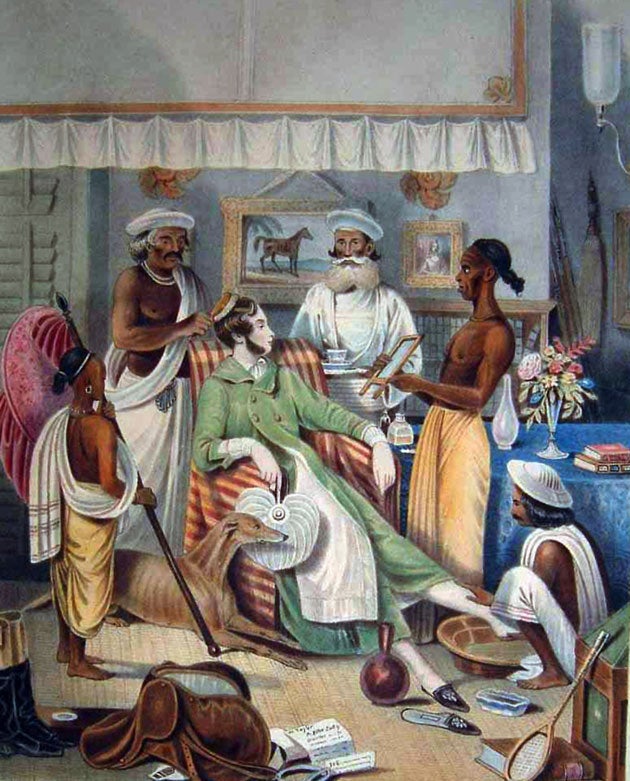The Inner Life of Empires, By Emma Rothschild

Your support helps us to tell the story
From reproductive rights to climate change to Big Tech, The Independent is on the ground when the story is developing. Whether it's investigating the financials of Elon Musk's pro-Trump PAC or producing our latest documentary, 'The A Word', which shines a light on the American women fighting for reproductive rights, we know how important it is to parse out the facts from the messaging.
At such a critical moment in US history, we need reporters on the ground. Your donation allows us to keep sending journalists to speak to both sides of the story.
The Independent is trusted by Americans across the entire political spectrum. And unlike many other quality news outlets, we choose not to lock Americans out of our reporting and analysis with paywalls. We believe quality journalism should be available to everyone, paid for by those who can afford it.
Your support makes all the difference.If history is the sum of innumerable biographies, it is bound to be full of gaps; for most human beings made scarcely a mark on the annals of the past, perishing as though they had never been. Occasionally, however, records of obscure existences do survive, often scattered to the four winds. This is true in the case of the 11 surviving children of James and Barbara Johnstone, born in the lowlands of Scotland between 1720 and 1739. By a prodigious feat of research, Emma Rothschild unearthed a treasure-trove of documentary evidence about them. In this marvellous book she uses it to reconstruct a family life that would otherwise be lost.
The Johnstones came from the pinched professional class of lawyers and factors, and James's small estate was heavily mortgaged. Nevertheless, he managed to educate his brood, though, as their vast correspondence reveals, the girls spelled more erratically than the boys. But what mattered, as they fled the nest, was that their letters conveyed much of the essence of the 18th century, an age of commerce, conflict, insecurity, imperial expansion and intellectual effervescence.
Thus Margaret Johnstone was such an ardent Jacobite that she was imprisoned in Edinburgh Castle, whence she made a daring escape and joined her husband in France. Her brother Alexander went into the army, fortified Grenada and bought a large sugar plantation on the island together with 178 "Negroes and Mullatoe slaves". William Johnstone, a friend in youth of Adam Smith and David Hume, married an heiress, changed his name to Pulteney, helped to finance his brothers' careers and, shortly before dying as the wealthiest commoner in England, opposed Wilberforce's 1805 bill for the abolition of the slave trade. George, who became Governor of West Florida in the 1760s, tried to foster a war of extirpation between the Choctaws and Creeks.
John Johnstone served in the East India Company, learned Persian and Bengali, fought as an artillery officer at Plassey in 1757 and married a published poet. He also made a fortune, being denounced by Robert Clive (who was, of course, when enriching himself, astonished at his own moderation) as a monster of corruption, avarice, rapacity, extortion and falsehood. William, by contrast, who hoped to follow in John's footsteps, died aged 19 in the "Black Hole" of Calcutta. The Johnstones' youngest child, Gideon, served all over the world in various military and entrepreneurial capacities, also bringing home modest pelf, earned partly from a business selling Ganges water to Indian pilgrims.
What is remarkable about the Johnstone family, as Rothschild says, is that they were almost invariably opposed to progress. Most benefited from the slave trade and John's Bengali bondswoman, Bell or Belinda, charged with having murdered her baby in Scotland, was the last person judged to be a slave by a British court. Most also opposed the American Revolution. John and George attacked Clive relentlessly for his abortive attempt to stop Britons bleeding Bengal white. When he committed suicide, a friend told them that they had "done for poor Clive," who "treated himself as he did the India Company, made it great and cut its throat".
Rothschild finds it hard to reconcile the Johnstones' ruthless self-seeking with the canons of the Scottish Enlightenment, whose high-minded modes of speech and thought they were apt to employ. Perhaps this merely reflected the inevitable disjunction between practising and professing, and at times Rothschild seems to infer too much about the family's worldview from the philosophical revolution of the time. For example, she says that John combated Clive's Indian reforms on grounds of laissez-faire economics whereas his real motive was surely to facilitate imperial exploitation.
Still, Rothschild's analysis is wonderfully subtle and backed up by an extraordinary depth of reference – her endnotes sometimes mutate into erudite little essays, which are well worth reading. Furthermore, she brings her characters to life, filling pages with detail as vivid as the Indian fabrics John sent home. One can almost hear Jamie Johnstone's senescent lament: "Mirth Chearfulness & Gayity fly before Silence Wrinkles and Grey hairs." One feels the pain of his "Putrid Fever" – "Pustules as large as nuts." Of course, there are still gaps which cannot be filled; but this magnificent family history contains (in Hume's phrase) a seething "multitude of views and glimpses".
Piers Brendon's books include 'The Decline and Fall of the British Empire' (Vintage)
Join our commenting forum
Join thought-provoking conversations, follow other Independent readers and see their replies
Comments